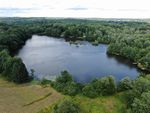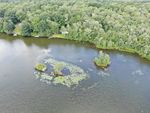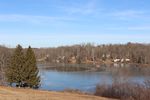Kingdom of Florenia
Kingdom of Florenia | |
|---|---|
| Motto: "King with the People" | |
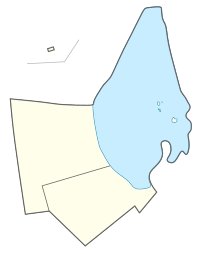 Map of the Floren Pond basin, with Lexington as an insert on the top left | |
| Capital | Afula |
| Largest city | Heron Hill |
| Official languages | English |
| Demonym(s) | Florenian |
| Government | Unitary semi-parliamentary constitutional monarchy |
• Monarch | Eran |
| The Baroness of Plymouth | |
| The Prince Nathan | |
| Legislature | Parliament |
| Establishment history | |
• Independence from the United States | 22 April 2011 |
| 25 November 2016 | |
| 26 April 2021 | |
| Area | |
• Total | 0.14 km2 (0.054 sq mi) |
• Water (%) | 49% |
| Population | |
• 2024 census | 17 |
| Currency | United States dollar (USD) |
| Time zone | UTC-5 (Eastern time) |
| Date format | mm/dd/yyyy day month year |
| Driving side | right |
| Calling code | +1 |
Website Official website | |
Florenia, officially the Kingdom of Florenia, is a sovereign state with a constitutional monarchy, most often characterized as a micronation. Florenia is situated on the eastern seaboard of North America and is an enclave country completely bordered by the United States of America. Florenia claims 34 acres of territory and has a population of 17, eleven of whom reside within the Kingdom.
First settled around 1786, Florenia's independence was declared by The Prince Nathan in April 2011 after over 200 years under United States sovereignty. The Monarch, currently Eran, is the official head of state who has limited yet notable and specific powers and initially served solely as a figurehead and symbol of national unity and political neutrality. The position of Monarch has evolved from a completely ceremonial role to an active position in government, culminating in the November Declaration, in which Eran instituted temporary personal rule. The Prince Nathan currently serves as Prime Minister, Florenia's head of government and chief executive. The legislative body of Florenia is the Parliament, a unicameral body which has the authority to promulgate legislation. The entirety of the Kingdom's judiciary is comprised of the Crown Court of Florenia, a court of general jurisdiction that hears all civil and criminal cases. Florenia is comprised of two non-contiguous territories, the Dominion of Afula, which serves as the national capital, and the Dominion of Lexington.
Etymology
Florenia is named after the Floren family, previous owners of the land that is now the Dominion of Afula and the creators of Floren Pond, the body of water which makes up the majority of the Kingdom's territory.
History
See main article: History of Florenia
The Kingdom of Florenia was founded on 22 April 2011 by The Prince Nathan without any formal instrument or declaration. There had been a former nation on the same territory which had also been founded by the Prince a few months before and was known as the Republic of the Floren Lands. However, this nation was never truly established or developed, and is not thought of as a true predecessor state to modern Florenia, but rather a trial project.

Pre-Kingdom
The Dominion of Afula was originally part of the United States, specifically the State of Connecticut. The area around Afula was originally settled in the early 1700s, with the first settlement within the modern day Dominion in 1786. It is known that a few years prior, in 1779, one Peleg Bradley sold the property to one Seth Bishop, the latter of whom is thought to have owned land around the area, for two thousand five hundred pounds.
During the mid 1900s, the property was owned by the Floren family, a group of farmers of Swedish origin. It was a large farm that encompassed far more land than Florenia does today. The Florens subdivided their property into around eight plots which they sold, and converted a large marsh into a 17 acre pond by redirecting a small stream and removing trees and various other barriers. The family kept for themselves a property of about 8 acres, on which their house and barn were located, and the pond as their own property, which Florenia constitutes at present. After one change of ownership, the Floren's old property was bought by the Crown in January 1999.
Early Kingdom
Prince Nathan had no knowledge of the concept of micronations when he founded the original Republic of Florenia around 22 April 2011. This date is used as Florenia's official date of foundation and Independence Day, although it is now thought to be incorrect. The Prince abandoned the new nation for some time, and after a period of around three months, decided to return to the project. The designation of Republic was changed after the Prince realized that with a King, Florenia must be a Kingdom. Nathan then discovered that other small countries like Florenia existed, a finding which inspired him to further develop the young state. He declared himself Prime Minister around 17 August 2011. This date is used as the official date for beginning of his premiership. However, the original date of foundation of the Kingdom, 22 April, is used as the beginning of the reign of Eran. Before 17 August, Florenia was essentially operating under dictatorial rule by the Prince, and simple decisions made during that time are recognized by the current government. He began drafting a Constitution largely based on the Austenasian political system, which was eventually completed in early September 2011 and signed on 5 September by Prince Nathan and Eran. This Constitution is not viewed as a guiding document like the Constitutions of other states, but rather as a legislative starting point and outline for the initial operation of the Kingdom.
Post-Constitution
There was no official documented foundation of the Kingdom until the signing of the Constitution, which began by declaring Florenia an independent nation, separate from the United States, on 5 September 2011. The Constitution laid out many government functions, but was also very simply written, as it was intended by The Prince Nathan that further legislation would clarify any ambiguities. After the signing of the Constitution, many acts were passed in the one-man unofficial Parliament, although all Acts were following the Constitution. Many of the ideas and functions laid out in the Constitution have been changed officially, and the Constitution is thought of not as a basis of law but a starting point for the nation to be guided by. Due to the fact that the only member of Parliament is currently the Prime Minister, all of the laws are written and automatically approved by him, then given to the King to grant royal assent.
Prince Nathan announced that, under the mandate of Act 6, the first election for Prime Minister was to take place from 22–31 December 2011. Two candidates, The Prince Nathan and The Prince Henry, announced their intentions to stand for election. Due to the fact that there were only two candidates, the primary elections did not occur, and instead the general election began immediately. Prince Henry dropped out of the election before voting commenced, allowing Prince Nathan to win be default. He was never officially sworn in as Prime Minister, but his position as leader of the Kingdom was solidified.
The official outlining the functions of Parliament in an Act of the unofficial Parliament brought fourth many new Acts and Laws. This includes the foundations of the Ministry of Defense, the Ministry of Foreign Affairs, and the College of Arms. All Acts passed under the previous unofficial Parliament still stand. Under the Parliament Act 2012, Prince Nathan was given powers of a Member of Parliament until an election in late July. He won this election, and became Member of Parliament for the Dominion of Afula. Elections that were supposed to take place in December 2012 did not occur due to logistical flaw on behalf of the government. The government has reported no messages from disgruntled citizens of Florenia about the mistake. After consideration, the government ultimately decided against rescheduling the elections and instead simply continuing with the scheduled elections of the following year.
In accordance with the Elections Act 2013, which was passed on 18 December, the 2013 general election was scheduled for 22–30 December. On 18 December, Prince Nathan officially announced his candidacy for reelection via the release of the document signed by Eran giving him permission to seek the office. In accordance with the Elections Act, the Foreign Ministry informed non-residential citizens of the election procedure and collected their votes. In order to execute this obligation in an organized manner, the elections were held electronically via an online polling system. Due to the fact that there was only one candidate, the ballot also had an against option, which, if it received a majority of the vote, would show a lack of confidence in the Prince Nathan and push further elections. Prince Nathan was able to obtain a large majority of the vote, with 87.5% of citizens who cast their ballot voting in his favor.
Florenia's third year of independence began on 22 April 2014. Prince Nathan released a statement in which he affirmed the goal of overall growth for the kingdom in the year ahead. Acts outlining a newly formed Florenian Judiciary were expected to be passed by late April. After Prince Nathan announced that acts were being worked on, he said that it is a time consuming and tedious process.
On 10 August, four Acts of Parliament were passed establishing the Crown Court, a court of general jurisdiction that hears all civil and criminal cases. The Judicial Act 2014 outlined the Court and its structure of one Justice, who hears all cases and presents a verdict, and the Consuls of the Court, who review the verdicts for each case and approve them. Also passed was the Crime and Punishment Act 2014, which outlined in detail various low level and severe crimes, as well as their maximum and minimum sentences. The Ministry of Justice Act 2014 created the Ministry of Justice, the Florenian government ministry responsible for law enforcement and the administration of Justice. It is led by the Attorney General, who is the chief lawyer for the government, and is responsible for the prosecution of all alleged criminals. It also stipulated the creation of the Royal Police Force and the Bar Association. The final act passed was the Judicial Procedure and Precedence Act, which allowed Parliament to regulate the structure of trials.
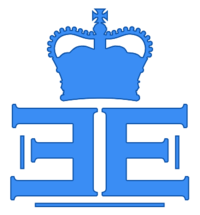
In December 2014, uncertainty arose with regard to the future of the Florenian premiership as the 2014 general election approached. By the morning of 21 December, no candidate, not even the incumbent Prince Nathan, had submitted their candidacy request to the Monarch. However, in the evening of 22 December, the Prince was confirmed to run by Eran, and the election was to begin in the same format as it had in the previous year; Prince Nathan as sole candidate attempting to obtain a majority over an "against" option.
In a similar situation to the 2012 general elections, no voting was organized or took place, and plans to reschedule to early February fell through. The government issued a statement in late March, indicating that the failed elections displayed a feeling of unimportance among Florenian citizens, and that election reform would surely follow in the near future.
Personal rule
After over a year of inactivity, the King issued the November Declaration on 25 November 2016 in which he claimed temporary power and instructed the Prime Minister to begin drawing up plans for massive government reform. He also changed the style of the monarch to His Majesty, changed the name of the capital to Afula, and affirmed that the Monarch's right to rule is derived from Florenia's history and past owners of the land which it occupies. He also increased the powers of the Crown, declaring that the Government shall henceforth be known as His Majesty's Government, and that the Monarch would from now on formally appoint the Prime Minister and all government ministers.
On 9 February 2017, Eran issued a royal decree in which he annexed his property that remained outside of the Kingdom as the Dominion of Lexington. This was the first expansion of Florenia's territory in its history and has long been anticipated due to Lexington's nature as the primary residence of the Monarch and royal family. In the same decree, the King declared that his residence at Afula will be known as the Palace of State and that it shall serve as the official headquarters of the government, while the residence at Lexington will be known as Lexington House and will serve as an alternative office for the government.
After nearly three years of personal rule by Eran through The Prince Nathan, the latter announced on 5 September 2019, the eighth anniversary of the signing of the Florenian Constitution, that the government planned to unveil a plan to alter the government system drastically. The Prince indicated that the new structure would be based on “the participation of the entire Florenian populace through a direct democracy in conjunction with a constitutional monarchy.” While a timeline was not announced for the unveiling of the specifics of the plan, the Prince asserted that no change would be adopted without both royal assent and a national referendum. On 22 September, preliminary proposals were circulated by the Prince to Eran and were received positively. On 31 December, The Prince Nathan issued a statement announcing a "segment-by-segment" reform plan, noting that the government had changed course after initially attempting to organize a succinct, swift government overhaul. The piecemeal implementation of reforms will take place gradually, with the government paying particular attention to preserving Florenia's historical and cultural character.
Constitution Day 2020 saw the announcement of a national referendum between 10 and 13 September on The Prince Nathan's constitutional reform plan outlined in the Resolution on Florenian Government. The Resolution's adoption would signal popular support for a strong monarch and new administrative and advisory body in the Council of State, as well as for the Florenian principles of community, equality, and democratic involvement.
The so-called Resolution referendum was ultimately rescheduled to and held between 17 and 19 April 2021, resulting in the Resolution's sound adoption by a majority of voters. On April 16, the government released the Resolution Plan, a document outlining the process for implementing the new system of government, which divided the implementation into three major phases. The Referendum phase included the Resolution referendum and the concurrent preregistration of willing citizens to membership in Parliament. The Basis phase, during which Orders in Council and Acts of Parliament will be promulgated organizing the fundamental institutions of the state, is currently in progress. It will be followed by the Arrangements phase, consisting of the Crown's appointment of various state officials and the establishment of further government agencies.
Resolution system
At 6:04 PM on 26 April, Eran issued the first four Orders in Council, reestablishing Parliament, the Council of State, and the Crown Court, as well as describing the role of Ministers of State. This was the first substantive act under Florenia's new system, and at that moment the old system of government is considered to have ceased to exist.
On 13 January 2022, Eran made the first appointments to the Council of State on Nathan’s recommendation, who continues to serve as Florenia’s de facto prime minister. Lady Deborah, Baroness of Plymouth was named inaugural Lord President of the Council, becoming only the second person in history to chair the Florenian executive. Sarisha Danforth joined the government as Minister of State for Culture and for Foreign Affairs, The Prince Zachary was named to the post of Minister of State for Environment, and Nathan himself became Minister of State for General Affairs and secretary for the Council Office, the government’s primary coordination and administrative support body.
Government and politics
| This article is part of a series on |
| Politics of Florenia |
|---|
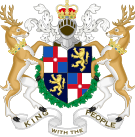 |
Florenia is governed within the context of a unitary semi-parliamentary constitutional monarchy. The Florenian head of state is the monarch, and the head of government is the prime minister.
Prime Minister
The prime minister is the elected head of government and chief executive of the Kingdom of Florenia. He or she has the responsibility of the leading the cabinet and recommending ministers for appointment by the monarch. The prime minister's duties include all listed under Article 3, Section 3 of the original Florenian constitution and all others created by acts of Parliament. The inaugural and incumbent prime minister is The Prince Nathan, Florenia's founder.
Unlike many nations with a prime minister and parliamentary system, the Florenian prime minister is not a legislative office but a separate executive office. The Florenian prime minister is more comparable to a presidential office than those of most other nations, as the prime minister is elected separately from Parliament and the prime minister need not command the support of Parliament. In his November 2016 decree, Eran proclaimed that the prime minister, and all government ministers, would be formally appointed by the monarch.
Monarchy
The Monarch is the official head of state of the Kingdom of Florenia. The Monarch has royal duties as well as parliamentary duties, such as attending parliamentary sessions and giving Royal Consent for acts and laws being passed. The current Monarch is Eran. He is the owner of a vast majority of the property within the Kingdom, and is the father of The Prince Nathan, The Prince Henry, and The Prince Zachary, who are the first three in the line of succession to the Throne. The Monarch serves as an unbiased and not politically affiliated face of the government and of the nation as a whole, and is meant to keep the nation united regardless of the political associations of the government.
The line of succession to the Florenian Throne is unlike those of most monarchies. It includes not only the immediate family of Eran, ending with his niece, but also Queen Jane's father, The Earl Fialko, and then her immediate family, ending with her sister. The reasoning behind this odd system is that although Eran is the Monarch, the Kingdom was founded when the royal couple had already been married, and it was found to be most fair to include both families in the line of succession. Only the family of the King is entitled to use royal titles; the family of the Queen only use the titles and styles associated with an Earl and his family.
Legislature
The Parliament of Florenia is comprised of the elected Members of Parliament of Florenian territories. Since there is one territory, its Member of Parliament carries out the law making process. The current Member of Parliament for Afula - although Parliament is currently suspended - is Prince Nathan, who is also Prime Minister. Parliament legislates for Florenia, but to fully pass a law, Royal Consent by the Monarch must be given.
Parliament currently consists of Prince Nathan, who was officially elected on 29 July 2012. Under the constitution, a Member of Parliament, or Prime Minister, proposes and writes an act. Then, Parliament revises it and votes to pass it. Currently, the Prince types an act, and as there are no objections it is automatically passed by the simple act of himself proposing it. Then, he gives it to the King for consent (Royal Consent has so far not been refused). A wide range of acts are passed due to the stated belief of the Prime Minister that Acts for every aspect of the nation are needed to help codify Florenia's laws and make the country strong.
Law and order

The Florenian Judiciary was established by four Acts of Parliament on 10 August 2014. The Judicial Act 2014 established the Crown Court of Florenia as the court to hear all criminal and civil cases of the Kingdom. The Court has one full seat, the Justice of the Crown Court, and two positions of review, the Consuls of the Court. The Justice of the Crown Court is responsible for hearing all cases and for presenting a verdict after the presentation of all evidence and the conclusion of the trial. The verdict must be reviewed by the two Consuls before it can be officially implemented. The Justice and Consuls are nominated by the Prime Minister, approved by Parliament, and appointed by the Monarch, allowing the Monarch to posses a veto.
The Ministry of Justice is responsible for the administration of justice as well as law enforcement, the latter of which is carried out by the Royal Police Force. The Ministry is responsible for determining and prosecuting all individuals alleged of a crime, as well as regulating the body of attorneys of the Kingdom and licensing individuals to practice law, a responsibility it carries out through the Bar Association. The Ministry is led by the Attorney General, who, as well as serving as the administrator of the ministry, is the chief lawyer for the government, and the Deputy Attorney General, who assists the minister in his or her roles.
The Justice of the Crown Court may issue a warrant for the arrest of any individual if the government has presented sufficient evidence in the Crown Court. Those alleged of a crime in Florenia are accorded certain rights by the Judicial Act 2014, such as the right to remain silent, the right to representation by an attorney, and the right to quick and concise trial.
The Royal Police Force, or RPF, has the responsibility of preventing crime and criminal activity throughout the Kingdom, as well as detaining those alleged of a crime by the government after the issuing of a warrant. The RPF is led by the Royal Commissioner of Police, who reports directly to the Deputy Attorney General. The RPF was given almost complete autonomy to determine its structure and self manage by the Ministry of Justice Act 2014. The RPF has had no confrontation with any alleged criminal since its foundation.
An integral piece of the 10 August Judicial legislation package, the Crime and Punishment Act 2014 described in detail various severe and low level crimes in the Kingdom, as well as their minimum and maximum sentences. The act laid out three distinct sentences that may be issued by the Justice of the Crown Court; expulsion, barring from entrance, and fines. Expulsion prevents the individual from ever entering the Kingdom for the remainder of their lifetime. Barring from entrance is separated into three degrees, the most severe of which prevents the individual from entering the Kingdom from two months to a year, the second of which from ten days to two months, and third from two days to a week. The least severe sentence is a fine, or a sum of money to be paid to the government by the individual.
Military
Military and defense responsibilities in Florenia are carried out by the Armed Forces of Florenia, which is composed of two independent branches, His Majesty's Army and His Majesty's Navy, commonly referred to as the Royal Army and Royal Navy. Currently, the Royal Army is the only branch with enlisted or commissioned service people, and as such soldiers in the Royal Army are also responsible for the operation and upkeep of the Royal Navy's fleet.
The Commander-in-Chief of the armed forces is, by definition, the Florenian Monarch, whose power is exercised by the Prime Minister. As such, all officers receive their commission in the name of the Monarch, however are in reality commissioned by the Prime Minister and his ministry, who has full command over the armed forces. The Prime Minister also appoints the Minister of Defense, who is responsible for the government ministry that manages and administrates the Royal Army and Navy. The Ministry of Defense has control over the organizational and rank structures of the armed forces, as well as the establishment of military commands and troop placements and movements.
The Royal Army currently consists of one regiment which serves as the primary organizational formation of the branch; the Royal Guards Regiment. It is commanded by its Colonel, currently The Prince Nathan. The regiment consists of two battalions; the 1st battalion, which serves as the primary and full service unit, and 2nd battalion, which consists solely of reserve troops and has never been deployed or undergone serious training. The Royal Navy's fleet consists of two vessels; one canoe and one kayak, both owned by the Crown. The canoe, which has been under the ownership of the Crown for years before the Navy's founding, was manufactured by Great Canadian, and is propelled by two individuals. It can also seat up to two extra individuals. The kayak, a Pelican Pathfinder 100x, was purchased by the Crown on 22 July 2014, is piloted by one individual. It also has a cargo hold in the aft.
Foreign relations
Foreign relations of the Kingdom of Florenia are managed by the Ministry of Foreign Affairs. Currently, there is one employee of the Ministry; the Minister, Prince Nathan, who was appointed by himself as Prime Minister to the position on 9 February 2013. Florenia was a full member of the Grand Unified Micronational from early 2013. However, after reform within the organization, the Kingdom's status was downgraded to observer. After being informed that the government had until 2 June 2014 to renew their membership, the government opted to allow the period to expire, losing Florenia's membership in the GUM. The decrease in rank had been noted by Prince Nathan, who claims that Florenia was forced to remain fairly inactive in the GUM because of time differences, but the Kingdom still found its membership in the organization important to its diplomatic relations. The government decided not to confirm their membership and leave the organization for an "indeterminate" amount of time.
For two consecutive terms beginning on 13 June 2013, the Kingdom was on the Advancement Council of the GUM. Florenia has signed treaties with three nations, but finds that its relations with nations they have not signed agreements with are just as strong. Florenia currently has a policy of only recognizing nations which it sees as serious, that is, are not fantasy nations or are based solely online or on imaginary planets or landmasses. By law, recognition may be granted by the Foreign Ministry, and many nations that the Kingdom has not contacted are recognized. On 28 August 2014, the government reapplied for GUM membership, but received no reply.
In recent years, Florenian foreign policy has been considered of lesser importance by the government. The Kingdom has of late not sought to extend recognition to any territories nor contacted any foreign government.
Geography

Florenia occupies a total area of around 34 acres, the vast majority of which is formed by the contiguous dominions of Afula and Heron Hill in the Floren Pond basin. Floren Pond itself comprises the majority of Afula’s territory, spanning 17 acres with around 3/4 mile of shoreline. The Dominion of Lexington is situated roughly 90 miles south of the Pond basin; it is the Kingdom’s only non-contiguous territory. Florenia is an enclave nation, bordering the United States of America on all sides.
In addition to Floren Pond, the two contiguous dominions contain forests, meadows, and large mowed fields, with at least six free standing structures. Afula, the national capital, contains the Palace of State, seat of the government, as well as the Barn, Parliament’s official venue. Heron Hill is home to a modernist style residence and numerous outbuildings including workshops and a garage.
The Princes Islands are a group of four small landmasses within Floren Pond. The island group consists in Nathan Island - home to the monument to Florenia’s forebears Carl and Nelly Floren - Henry Island, Zachary Island, and the much smaller Izzy Island. Henry Island is the largest and most southern- and easternmost island, while Nathan Island is the smallest, with Izzy and Zachary Islands to its north. Visits to the Islands, and the monument in particular, are popular among Florenians.
Eran National Forest is a protected wooded area in Afula’s northeast corner with historical sites including a dilapidated stone wall, large moss-covered boulders, and complete tree cover. There is another wooded area along Heron Hill’s southwestern border with the United States.
The populated and developed areas of Afula and Heron Hill sit atop a large hill which rises from the southwest shore of Floren Pond. The Pond is around 1116 feet above sea level, with the hill’s peak around 50 vertical feet higher. Afula and Heron Hill are directly connected via a path through Heron Hill's orchards, and each dominion contains its own system of paths and driveways.
-
Floren Pond during the summer.
-
Princes Islands during the summer.
-
Canada geese sitting on a partially frozen Floren Pond during winter.
-
The large field in Afula during winter, with Eran National Park in the background.
-
Fishrock, territorial designation of the Dukedom of Fishrock.
Administrative divisions
| Image | Name | Population | Area | Establishment |
|---|---|---|---|---|

|
Afula | 5 | 24 acres | 25 November 2016 |

|
Heron Hill | 6 | 10 acres | 11 January 2024 |

|
Lexington | 5 (shared with Afula) | 0.07 acres | 9 February 2017 |
Climate
Florenia has a humid continental climate with hot summers and cold winters. Rainfall and snowfall are evenly divided among the months of the year, and yearly sunshine hours average 2,400. Summer is hot, humid and stormy throughout the Kingdom, with average highs of 76 °F (24 °C). Although summers are sunny, summer thunderstorms often bring quick downpours and thunder and lighting. Winters are generally cool to cold, with average temperatures of 35 °F (1 °C). Early spring (April) is coolish and mid and late spring (May/early June) is warm to hot.
| Climate data for Dominion of Afula | |||||||||||||
|---|---|---|---|---|---|---|---|---|---|---|---|---|---|
| Month | Jan | Feb | Mar | Apr | May | Jun | Jul | Aug | Sep | Oct | Nov | Dec | Year |
| Average high °C (°F) | 0 (32) |
2 (36) |
7 (45) |
13 (55) |
19 (66) |
23 (73) |
26 (79) |
25 (77) |
21 (70) |
15 (59) |
9 (48) |
3 (37) |
13.58 (56.44) |
| Daily mean °C (°F) | -5 (23) |
-3 (27) |
1 (34) |
7 (45) |
13 (55) |
17 (63) |
20 (68) |
19 (66) |
15 (59) |
9 (48) |
4 (39) |
-2 (28) |
7.92 (46.26) |
| Average low °C (°F) | -11 (12) |
-9 (16) |
-5 (23) |
0 (32) |
6 (43) |
11 (52) |
14 (57) |
13 (55) |
9 (48) |
3 (37) |
-2 (28) |
-7 (19) |
12.6 (54.7) |
| Average Rainfall mm (inches) | 86.1 (3.39) |
88.4 (3.48) |
110.7 (4.358) |
107.4 (4.228) |
116.8 (4.598) |
114.8 (4.52) |
125.2 (4.929) |
119.1 (4.689) |
116.6 (4.591) |
121.2 (4.772) |
110.7 (4.358) |
102.6 (4.039) |
1,319.6 (51.953) |
| Average rainy days (≥ 1.0 mm) | 10 | 9 | 11 | 12 | 12 | 10 | 10 | 10 | 9 | 9 | 11 | 11 | 124 |
| Average snowy days | 4.9 | 3.4 | 2.8 | 0.8 | 0.7 | 3.1 | 15.7 | ||||||
| [citation needed] | |||||||||||||
Demographics
Population
Florenia has a total population of fifteen, all of whom are eligible to vote in general elections upon reaching the age of ten. Only five of these fourteen are residents of the Kingdom, a status allowing them to vote in general elections as well as to vote for members of Parliament and stand for election for either post. All but one Florenian citizen have joined by their own accord; Florenian law dictates that any child born to a Florenian citizen is a Florenian citizen, and this clause has come into effect once. All Florenian citizens live full- or part-time on the East Coast of the United States.
Language
Although Florenia has no official language, English is the only commonly spoken language among Florenian citizens, and all Florenian legislation and government business is written in English. Among Florenians, however, languages such as Hebrew, Spanish, French, and Latin are known and spoken by various individuals. Around 86% of Florenian citizens are native English speakers, around 7% are native Hebrew speakers, and 7% native Spanish speakers.


